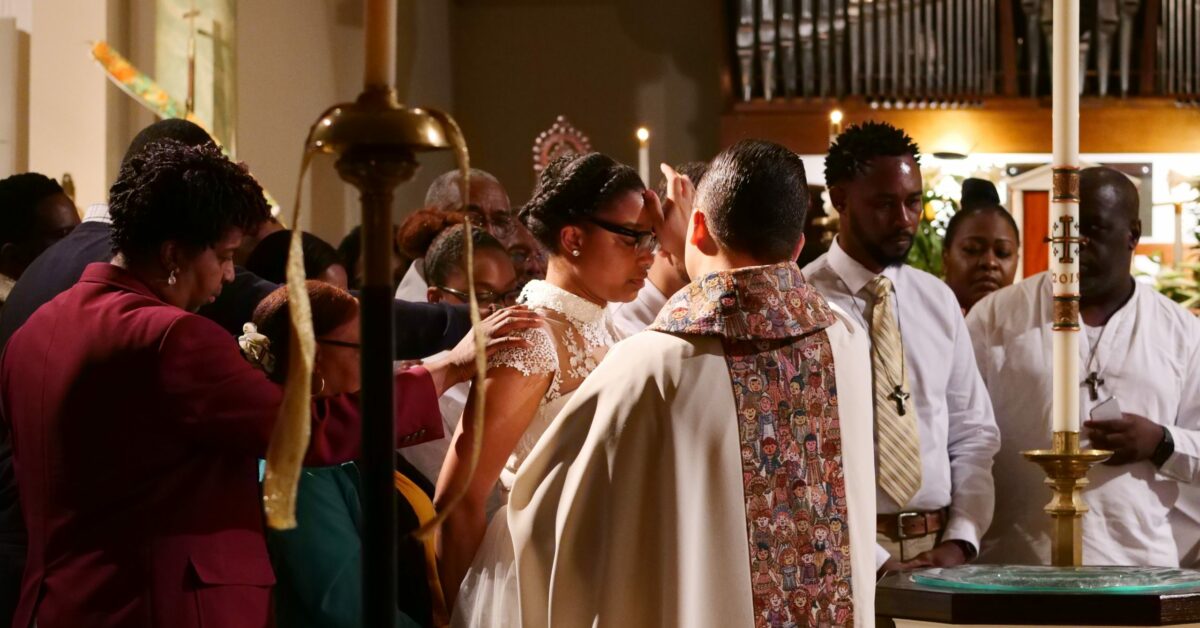Overflowing Gifts: The Spirit’s Baptismal Outpouring
Leading through the Water, as Paul Galbreath indicates in chapter 7, leads not to baptism as an end, but to life in view of baptism: the baptismal life. That baptismal life is fed by an overflowing stream of baptismal gifts that sustain the church’s life and bear witness to Christ in the world. Those gifts come from the Holy Spirit’s outpouring in baptism (see Galatians 5:22 and other passages). The gifts that the Spirit brings to flourishing are summarized in the chrismation anointing text (not in LSB): “the spirit of wisdom and understanding, the spirit of counsel and might, the spirit of knowledge and the fear of the Lord, the spirit of joy in God’s presence.” The church’s task throughout the catechumenate, but especially in the post-baptismal mystagogy, is to guide the neophytes (newly baptized) to discover the gifts unique to them and how they might best employ them.
Galbreath summarizes the gifts of the spirit under four primary headings: Family, Covenant, Anointing, and Baptism itself. Each of the neophytes receive a new family through baptism, the church. Everyone is grafted anew into this family through baptism and contributes to the up-building of the family, enriching its quality of life through the gifts bestowed upon them. As Paul says in Romans 12:10, in this family they are to “Love one another with brotherly affection. Outdo one another in showing honor.” As Galbreath notes, “Discipleship creates a new community of brothers and sisters” (99).
This family’s life is supported by the gift of the covenant. As a Presbyterian, such an image for baptismal is central for Galbreath (and a gift that Lutherans should not neglect). All the baptized, every child of God, belongs to this covenant community. The gift realized through this baptismally-covenanted community is, as Galbreath observes, “a relationship of trust and support in which the community pledged to teach and model faith to those who received baptism” (101). Central to the established covenant is God’s faithfulness. Baptism seals (literally through the water and the powerful symbol of anointing) God’s covenant with his people and their commitment of faith in him.
The third gift of baptism is anointing with oil. Diverse Greco-Roman bathing patterns contributed to the staying power of this gift in Christian practice, in addition to Old Testament practice. Eventually a primary referent of the gift of anointing is Christ, the Anointed One. But it acquires a multitude of meanings: baptismal anointing symbolizes protection and healing, gladness and thanksgiving. And that only scratches the surface. All the baptized are anointed in the Spirit for service.
And Baptism itself is a gift because there are a multitude of meanings to unpack in baptismal life. Through our baptisms we read the biblical text in a different way, that is, in light of baptismal regeneration through the Triune God.
The gifts we receive in baptism are intended to be used in service to the neighbor and in thanksgiving to God. We give these gifts in service to our new family, the body of Christ. And we use them in ministry to the world. The post-baptismal period of Mystagogy provides space and time for the church to help the newly baptized discern their gifts for ministry in the world: How to use them, when to use them, and what to speak when using them. Galbreath provides two excellent ideas for naming these gifts: attaching pictures of members as associated with one of the gifts of the spirit to a tree of life and inviting sponsors to offer testimonies about the gifts that the newly baptized bring to the assembly (105-106). And every time we celebrate aspects of Christian vocation we can gather around the font as the baptismal family.
As the baptismal gifts abound and overflow in the newly baptized, the catechumenate has achieved one of its ends: the pouring out of the Spirit of the Lord upon the earth through the Lord Jesus Christ. “The Spirit of the Lord is upon me, because he has anointed me to proclaim good news to the poor. He has sent me to proclaim liberty to the captives and recovering of sight to the blind, to set at liberty those who are oppressed, to proclaim the year of the Lord’s favor” (Luke 4:18-19).
